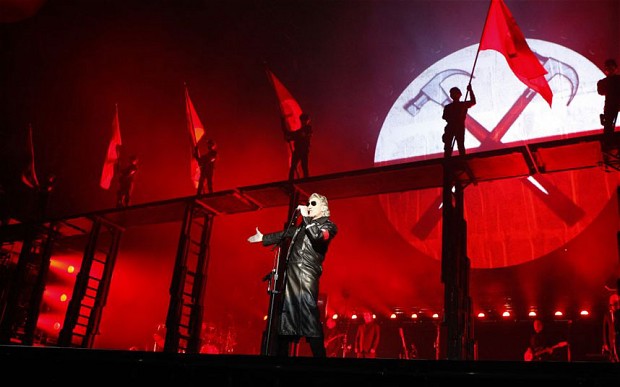You have no items in your cart. Want to get some nice things?
Go shopping
Roger Waters, the Easter Island-headed prophet of Pink Floyd, recently revived the band’s seminal 1979 album The Wall on a worldwide stadium tour. Just why did Waters return to The Wall? On his official website, he says:
The story of my fear and loss …provides an allegory for broader concerns: nationalism, racism, sexism, religion, whatever! All … are driven by the same fears that drove my young life.
While Waters acknowledges that the album initially arose from his own highly personal tale, in recent years he has recognised its potential to relate to a wider socio-political context. Indeed, The Wall is nothing if not a searing dystopian narrative. The OED defines a dystopia as “an imaginary place or condition in which everything is as bad as possible”, but more specifically, the following elements are pervasive: constant state surveillance, a widespread lack of freedom and dehumanisation of the masses, corruption and injustice, prolific propaganda within a system of indoctrination and a “personality cult” figure. Each of these elements was very much present in the performance of The Wall I attended in September at Wembley Stadium.
From the outset Waters made clear that this spectacle was intended as a deeply felt protest against injustice and outrages perpetrated by governments and state machinery worldwide. Before performing a sombre and altogether darker version of Another Brick in the Wall, he said: “This concert is dedicated to Jean Charles [Menezes] and victims of state terrorism all over the world.” Waters’s critique didn’t stop there. He continued to hammer home his protest against excessive state power with the songs that followed, without exception.
Prior to this show, I always saw Mother as one of the most personal songs on the album, about a stifling and overprotective mother who nonetheless wishes the best for her son: “Mother will check out all your girlfriends for you,” sings Waters. “Mother will always find out where you’re been.” (Though there remain disturbing overtones: “Mama’s gonna make all of your nightmares come true… Put all of her fears into you.”) However, in this stage incarnation, Mother was taken from the personal sphere and propelled into the expressly political. A giant, sinister-looking Mother came to life on the stage. Cold probing lights radiated out of her eyes, surveying the audience, with a security camera positioned by her. On a screen the words “Big Brother” appeared – so evocative, of course, of the most iconic dystopian novel of them all – with the “Br” in “Brother” crossed out and replaced with an “M”. This represented how dangerous our need to feel secure as a society can be – a need that can be used to manipulate us. The leaders who claim to have our best interests at heart are invariably to be the most distrusted. Such leaders justify the surveillance state by citing increased security, but in fact they rob us of more and more of our freedom.
After Waters sang the line “Mother should I trust the government?”, big red letters were projected onto The Wall, spelling out “no fuckin’ way” – drawing a great reaction from the audience. It’s no surprise that this sentiment had no such resonance: in addition to longstanding political disaffection, this is a country which has between 4 and 5.9 million security cameras (according to a report in July). That is approximately one camera for every 11 people in the UK – a very disquieting statistic and one that makes Waters’s surveillance state Mother seem all the more plausible.
The larger the state, the more it can impose into our everyday lives. Heather Brooke’s The Silent State is one such exposé of just how much data the government has built up about us in recent years, the extent of which is kept largely hidden from us. If we are kept unaware of what is happening with governmental legislation and the way in which the state uses our data, the state can go ahead even with oppressive laws and experience less opposition than it should rightly have. In light of last week’s revelations that the US and UK governments struck a secret deal to allow the NSA to “unmask” our data, Brooke’s arguments hold greater weight than ever.
Goodbye Blue Sky’s projected animation – which has previously attracted considerable controversy – was a very explicit critique of corruption and abuses of power within corporations, ideological belief systems and organised religion. The crucifix, star of David and star and crescent fell from aeroplanes like bombs, alongside the corporate logos of Mercedes, Shell and McDonald’s – as well as communism’s hammer and sickle and capitalism’s dollar sign.
Such anti-war and anti-profiteering messages were iterated again and again during The Wall. Nobody Home’s animation illustrated the individual’s powerlessness against nefarious military planes flying overhead, while during Vera Lynn, a damning quote by Eisenhower was projected onto The Wall: “Every gun that is made, every warship launched, every rocket fired signifies… a theft from those who hunger and are not fed, those who are cold and not clothed.”
Again, Waters was focusing on the human fallout of cold, calculated military actions. Malala Yousafzai, the extraordinary campaigner for girl’s education, has drawn renewed attention to the fact that the world’s most powerful nations spend so much on their forces but shamefully little on education. As she defiantly said at the UN in September: “Instead of sending weapons… to Afghanistan and all these countries which are suffering from terrorism, send books.” Unsurprisingly, the 2013 Global Peace Index shows that the world has become less peaceful.
Another Brick in the Wall: Part Three, meanwhile, began with footage of a French newscaster projected onto one of the bricks in the centre of the screen. The surrounding bricks then rapidly filled up with footage of newscasters speaking different languages: a potent Chomsky-esque critique of the way the media gives us a particular slant on certain events, depending on where we live. Tracking back to Another Brick in the Wall: Part Two, this is a continuation of the way we are taught to think in school. We are expected to conform to a particular ideological mindframe (“we don’t need no thought control”), actively prevented from attempting to form our own potentially subversive opinions.
Goodbye Cruel World ended on a particularly disturbing note: as Waters sang in a mocked-up living room from the last brick that was yet to be covered up, he was being targeted by the red dot of a sniper rifle. As the song ended, all went startlingly black – a highly laden critique of the military and political sphere intruding into the personal and domestic.
The finale of The Wall, segueing fromWaiting for the Worms into The Trial, was the most visually arresting projection in a concert loaded with spectacle. The sheer perversion of the judge was highlighted through snippets of cartoonish video, while Waters inhabited the role of megalomaniacal dictator, equipped with a megaphone and wearing a uniform. The song was also accompanied by quotations from 1984 – most notably “he loved Big Brother” – and the opening of Kafka’s The Trial.
The Wall was a forceful, resolutely spectacular reminder of just why dystopias hold such power over the imagination. While they show us a vision of the worst future possible, they simultaneously reveal disturbing and uncomfortable truths in our present. They act as a warning. They are often an attempt on the part of their creator to urge us into action, so that we feel moved to change the things that we see are deeply wrong with our world – a motivation that clearly courses through Waters’s veins.
Waters’s stadium tour coincides with a cultural dystopian turn: Black Mirror on the television; The Hunger Games in the cinema; Margaret Atwood’s MaddAddam in the bookstores; Headlong’s acclaimed 1984 on the stage. The sheer variety of The Wall‘s multidisciplinary spectacle, and the scope of its concerns, make it a powerful, pounding distillation of this trend. Just before Run like Hell, Waters wryly asked: “Are there any paranoids in the theatre tonight? This song is for you.” As he had shown us repeatedly throughout the evening, we have plenty to be paranoid about.
You can visit Roger Waters’ official website here.

About Ana Malinovic
Ana graduated from Warwick University with a BA in English and American Literature in 2010. Her dissertation was centred on dystopian elements in the fiction of Kafka. She enjoys uncovering innovative works of fiction by a diverse range of authors. She also spends much of her time roaming around London's arts and culture scene overexcitedly. Check out her blog




